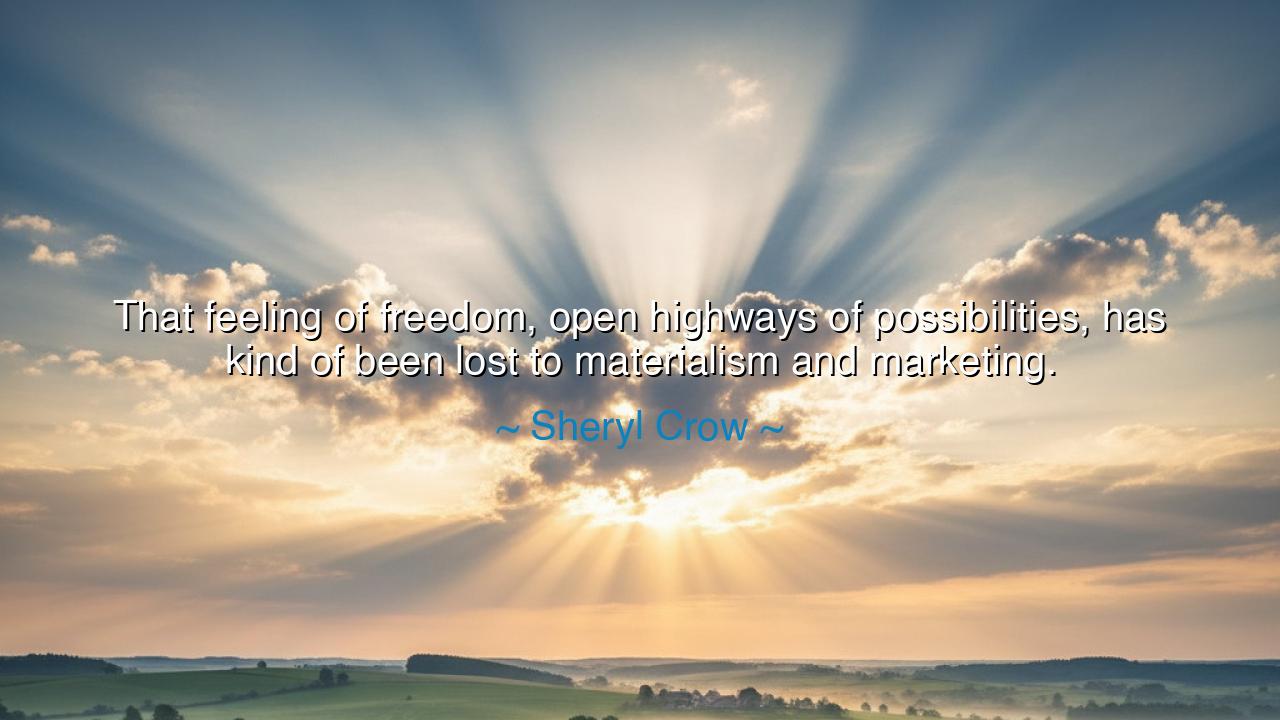
That feeling of freedom, open highways of possibilities, has kind
That feeling of freedom, open highways of possibilities, has kind of been lost to materialism and marketing.






Host: The room was calm, the soft hum of the city outside the window barely reaching the space within. Jack sat near the window, his fingers absentmindedly tapping on the armrest, his gaze lost in the horizon. Jeeny, sitting across from him, was reading but seemed to be thinking more deeply than the pages in front of her. The evening light had softened, casting long shadows in the room. It was the kind of silence that invited a deeper reflection.
Host: Sheryl Crow’s words, “That feeling of freedom, open highways of possibilities, has kind of been lost to materialism and marketing,” cut through the stillness. The idea that the sense of limitless potential we once felt—whether it was through the open road or a life full of options—had been replaced by the noise of materialism and consumer culture, felt both familiar and unsettling. Jack, always one to engage with ideas that felt a little too close to home, was the first to speak.
Jack: His voice was reflective, almost a little hesitant: “I get what she’s saying. There was a time when possibilities felt endless, right? The open road, the future, everything felt full of potential. But now, everything feels so… consumed. We’re surrounded by ads, by constant reminders of what we need, what we should want, and it’s like we lose sight of what freedom actually means. It’s all about buying something, not about experiencing something.”
Jeeny: She nodded, her expression thoughtful as she set her book aside. “Exactly. Crow’s pointing out that we’ve let the idea of freedom become tied to what we can acquire. The more we buy, the more we’re told we’ll be free—but it’s a kind of false freedom. It’s not about open highways anymore; it’s about chasing the next thing that promises happiness or success. But in doing so, we lose the true sense of possibility. Freedom becomes about what’s marketed to us, not about what’s genuinely ours to create.”
Host: There was a shift in the room, the quiet hum of their conversation now carrying the weight of a deeper realization. The freedom they were talking about wasn’t just physical—it was mental, emotional, and spiritual. The open road Crow referred to wasn’t just a literal path, but a metaphor for the endless choices and opportunities life once felt full of. But now, it seemed, those choices had been replaced with pre-packaged desires, sold back to them in the form of materialism and consumer culture.
Jack: His voice softened, now almost reflective: “It’s funny. When you think about the freedom we once felt—whether it was from taking a spontaneous trip or just the feeling that the world was open to us—now it feels like we’re constantly being sold the idea that freedom comes through stuff. Cars, clothes, technology—it’s all about owning things to feel fulfilled. But it’s kind of a trap, isn’t it? You think you’re free, but the more you consume, the more it feels like you’re just bound to what’s being sold to you.”
Jeeny: She smiled slightly, her voice gentle, but with a quiet insight: “Exactly. It’s like we’re told that to be happy, we need to buy into a certain lifestyle, a certain image. But real freedom isn’t about the things you own. It’s about having the space to make your own choices, to create your own path, without being constantly influenced by what everyone else tells you you need. The more we’re marketed to, the more we lose the feeling of true possibility.”
Host: The room felt heavier now, not in a negative way, but as if they had uncovered something true—a realization that freedom wasn’t just about outward circumstances, but about inner autonomy, the ability to choose for yourself. The conversation had shifted from the idea of consumerism as an external force to a more personal reflection on how easily they, too, had been swept up in the illusion of what freedom really meant.
Jack: His voice was now quieter, almost accepting, as if he were coming to terms with something: “Maybe that’s the problem. We think freedom means owning more or doing more, but it’s really about being able to let go of all the distractions, the noise, and just focus on what truly matters. The freedom to choose outside the boundaries of what we’ve been sold.”
Jeeny: She smiled softly, her tone warm and reassuring: “Exactly. Freedom isn’t about the things we can buy or own. It’s about being able to choose for ourselves, to live authentically, without being caught in the cycle of consumption and comparison. It’s about reclaiming that feeling of limitless possibility, without the weight of materialism defining what we’re allowed to have or do.”
Host: The conversation, once light, had now evolved into something deeper, as they both began to understand that true freedom wasn’t about possession or success in the traditional sense—it was about the space to think, create, and live authentically. The world outside continued in its familiar rhythm, but inside, the realization that freedom came from the choices we made, not the things we accumulated, settled between them. They sat together, knowing that the open highways of possibility were still there—waiting for those who were brave enough to look beyond the distractions of materialism.






AAdministratorAdministrator
Welcome, honored guests. Please leave a comment, we will respond soon